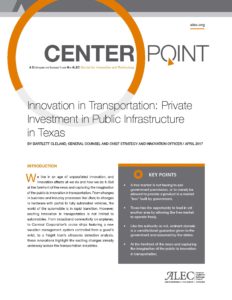Transportation
Key Points
- Vehicle fees and transportation taxes should only be used for infrastructure projects, such as routine road and bridge maintenance or new infrastructure construction.
- Utilizing public-private partnerships for infrastructure projects encourages private investment in a state and promotes public safety and operation efficiency.
- States should empower state agencies and departments to treat bids for infrastructure projects equally and allow all potential contracts to be considered to ensure the best utilization of transportation dollars.
Maintaining a functional and healthy infrastructure is one of the cornerstones to economic growth. State transportation policy should encourage the use of public-private partnerships to build and maintain infrastructure, give states the flexibility to determine how to best utilize transportation dollars and remove unnecessary burdens to innovation. Adopting free-market policies that include collaboration with the private sector, transportation systems and funding concerns can be greatly improved.
Creating transportation systems that respond to what consumers of these systems actually need is crucial to creating a smooth business climate that contributes to economic growth. Reforms such as allowing state agencies to evaluate vendors and contractors holistically and encouraging the use of toll roads and highway systems where the users of the infrastructure pay for its maintenance via user fees of some kind are important steps states can take to improve their transportation and infrastructure systems.
Model Policies
-
Resolution Urging Congress to Support Allowing Twin 33-Foot Trailers on American Highways Final
Whereas, there is a need to modernize regulations in trucking that will advance America’s transportation system, improve roadway conditions and improve the reliability and efficiency of deliveries in interstate commerce, ultimately growing the economy; and Whereas, more than 122.5 million households and 7.5 million businesses in the U.S. depend on…
-
Resolution on Automated Driving System Legislation and Regulation Final
WHEREAS, automated driving systems remain in the early stages of development, necessitating the establishment of a common definitional taxonomy. WHEREAS, the dynamic driving task refers to the real-time operational and tactical functions required to operate a vehicle in on-road traffic, excluding the strategic functions such as trip scheduling and selection…
-
Constitutional Amendment Restricting the Use of Vehicle Fees and Taxes for Highway Purposes Final
All fees collected by the State of {insert state} as license fees for motor vehicles and all excise taxes collected by the State of {insert state} on the sale, distribution or use of motor vehicle fuel, and any another motor vehicle related tax or fee shall be paid into the…
-
Vehicle Platooning for Safety and Efficiency Act Final
Section 1. (Legislative Declarations) Subdivision 1. A vehicle platooning system electronically coordinates the speed between a lead vehicle and one or more follow vehicles, enabling them to travel safely in a unified manner at close following distances. A vehicle platooning system relies on a connected and automated braking system, which…
-
Travel Agent Tax Fairness Act Final
Section 1. {Title} This Act may be cited as the “Travel Agent Tax Fairness Act.” Section 2. {Legislative Findings} The Legislature finds that: (A) Travel agents and online travel companies provide valuable services to travelers, showing comparisons of rates and amenities offered by multiple, competing hotel operators. (B) These facilitation…
-
Open and Fair Competition Resolution for Municipal [or Local] Water and Wastewater Projects Final
Open and Fair Competition Resolution for Municipal [or Local] Water and Wastewater Projects {Title, Enacting clause, etc.} Be it enacted by the [Insert jurisdiction]. Section 1. {Definitions} (A) “Governmental Agency” refers to any county government or municipality. (B) “Acceptable Piping Material” refers to piping material that meets current…


